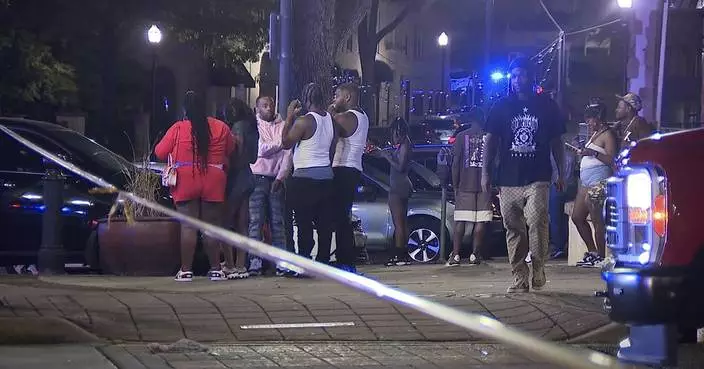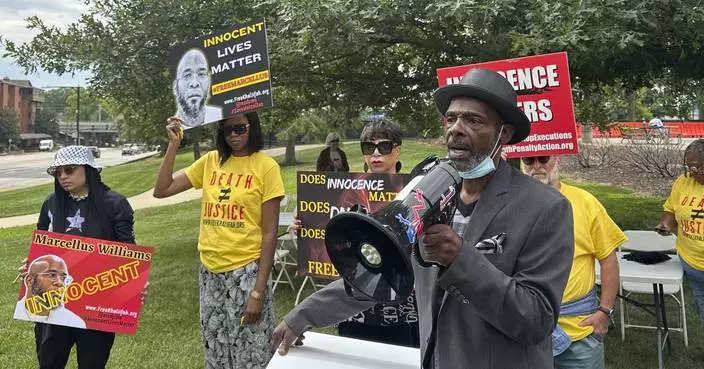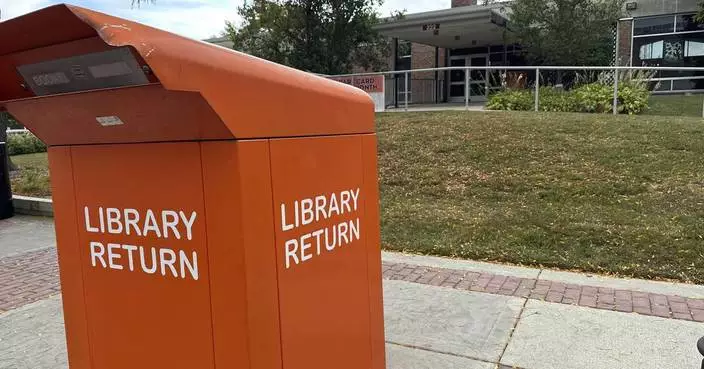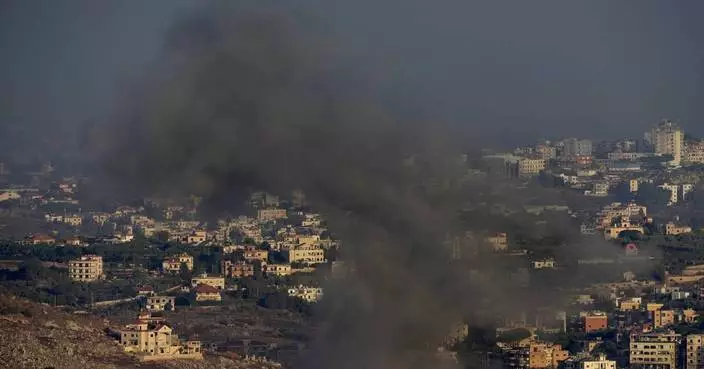NEW YORK (AP) — Jeanine Tesori watched the world premiere run of her “Grounded” with director Michael Mayer last fall at the Kennedy Center and noticed audience fidgeting.
“It didn’t need a transplant of a liver, but what it needed was maybe just a different approach,” Mayer recalled.
“Some rhinoplasty,” Tesori interjected. “A tracheotomy at one point.”
Tesori becomes the first woman composer to open a season in the Metropolitan Opera’s 141-year history when a revised “Grounded” starring mezzo-soprano Emily D’Angelo is given a gala premiere on Monday night. Thirty-five minutes have been cut since the six Kennedy Center performances, the first act trimmed from 82 to 60 and the second from 62 to 49. A Trainer character was eliminated.
“You don’t know until you know. And then you know,” Tesori said.
This is the fourth opera by Tesori after “A Blizzard on Marblehead Neck” (2011), “The Lion, the Unicorn, and Me” (2013) and “Blue” (2019). She won Tony Awards for the scores of “Fun Home” and “Kimberly Akimbo,” and Mayer won for directing “Spring Awakening.”
They have to adjust far less stage rehearsal time for opera than theater.
“The work doesn’t really start until you’re in previews when we’re doing musicals, whether it’s out of town or Broadway,” Mayer said. “It’s like triage. You deal with the bleeders right away, but then you have the time to look at what the next major things are.”
Based on George Brant’s one-woman play, “Grounded” tells the story of Jess, a fighter pilot grounded due to her pregnancy who becomes a Las Vegas-based drone pilot and crashes her Reaper rather than kill a young girl as collateral damage to a Middle Eastern target.
Brant wrote the play in 2011 after reading about the drone program in a “Stars and Stripes” online report. It opened in 2013 and gained attention with a 2015 New York Public Theater production starring Anne Hathaway. Brant also wrote the libretto and expanded the cast to include a husband Eric (tenor Ben Bliss), Commander (bass-baritone Greer Grimsley), Sensor (baritone Kyle Miller), an alter ego character Also Jess (soprano Ellie Dehn) and a chorus.
D’Angelo spoke with fighter pilots in her preparation.
“So much care was taken in really honoring and being true to what they do,” D’Angelo said. “There’s no caricature at work here. It’s all taken very seriously.”
On the day of the final Washington National Opera performance last Nov. 13, Tesori met in an upstairs rehearsal room with Mayer, dramaturg Paul Cremo, choreographer David Neumann and Mayer assistant Marcus Shields. The meeting started at 12:30 p.m. and stretched for 9 1/2 hours, resulting in a book filled with bullet points detailing needed changes. Tesori composed in a rented house on Long Island’s North Fork, taking a break for a January workshop and completing the revised score by April 1.
Met music director Yannick Nézet-Séguin was surprised Tesori made more cuts when rehearsals started in August. About 45 minutes of music was jettisoned from the world premiere version of last Oct. 28 and 10 minutes of new composition added.
“I was kind of defending the composer as we would do today if Verdi was alive or Donizetti: ‘The music is perfect as it is. Let’s not cut,’” Nézet-Séguin said. “It was fascinating to see that the composer herself was more like: `No, this needs to be cut because it’s detracting from what I want in the story line.'”
Ethel M. Smyth’s “Der Wald (The Forest)” was the first opera by a woman composer at the Met in 1903 and Kaija Saariaho’s “L’Amour de Loin (Love from Afar)” the second in 2016. After “Grounded,” the Met has three works by women scheduled in 2026: Saariaho’s “Innocence” (opening April 6), Gabriela Lena Frank’s “El Último Sueño de Frida y Diego” (May 14) and Missy Mazzoli’s “Lincoln in the Bardo” (Oct. 23).
“If we are claiming that opera needs to appeal to everyone and needs to be related and connected to the life experiences of everyone in the audience, we do have to present on the stage the vision of everyone,” Nézet-Séguin said. “I’m convinced it’s a very different perspective, and even the music sounds different because it’s a woman composing it.”
Mimi Lien’s set is dominated by 224 LED tiles, 140 panels and 28 half panels manufactured by ROE and rented from 4Wall Entertainment in a video design by Jason Thompson and Kaitlyn Pietras.
“I was interested in the kind of combination between image and space or between actual physical, tangible structure and virtual imagery and how to combine those,” Lien said, “colored with the overall context of drone warfare and surveillance and the kind of preponderance of imagery into our daily lives.”
There will be eight Met performances through Oct. 19, with the last televised to movie theaters worldwide.
Met opening night puts a spotlight on performers, productions and composers for an audience attending the start of New York’s social season, whom Nézet-Séguin termed "people who come to the opera just rarely or civic leaders or socialites and people from different industries.”
“It’s important to show them what our values are and who we are as an institution," he said.
Met general manager Pete Gelb has put a post-pandemic emphasis on contemporary composers.
“I’m living right now,” Tesori said playfully during a Sept. 9 creative team and cast discussion at the Guggenheim Museum. “We’ll see how next week goes.”
This update removes reference to Emily D’Angelo as being the only holdover.

This image released by the Metropolitan Opera shows Emily D'Angelo as Jess, seated left, and and Kyle Miller as the Sensor, seated right, during a performance of Jeanine Tesori's "Grounded" in New York on Sept. 16, 2024. (Ken Howard/Met Opera via AP)
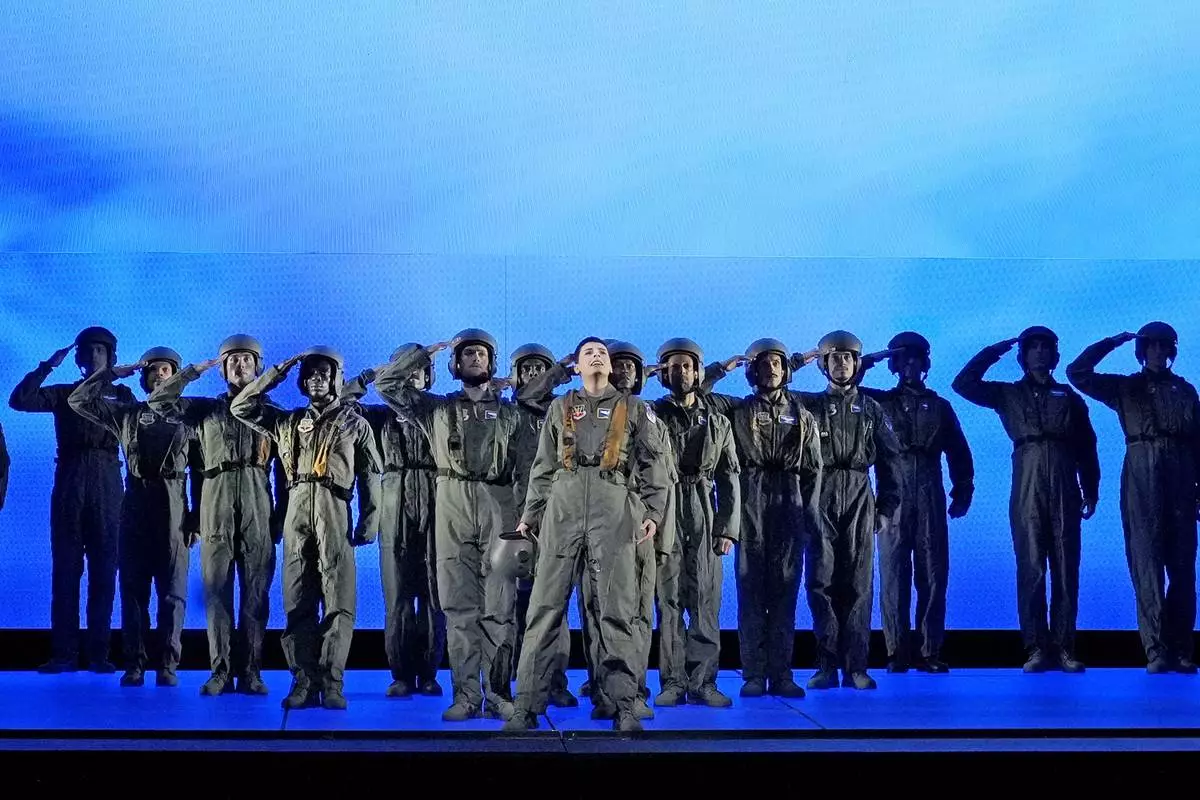
This image released by the Metropolitan Opera shows Emily D'Angelo as Jess, center, during a performance of Jeanine Tesori's "Grounded" in New York on Sept. 16, 2024. (Ken Howard/Met Opera via AP)
MARJAYOUN, Lebanon (AP) — Israeli strikes on Monday killed more than 270 Lebanese in the deadliest barrage since the 2006 Israel-Hezbollah war as the Israeli military warned residents in southern and eastern Lebanon to evacuate their homes ahead of a widening air campaign against Hezbollah.
Thousands of Lebanese fled the south, and the main highway out of the southern port city of Sidon was jammed with cars heading toward Beirut in the biggest exodus since the 2006 fighting. More than 1,000 other people were wounded in the strikes — a staggering one-day toll for a country still reeling from a deadly attack on communication devices last week.
The death toll surpassed that of Beirut's devastating port explosion in 2020, when hundreds of tons of ammonium nitrate stored in a warehouse detonated, killing at least 218 people and wounding more than 6,000.
In a recorded message to Lebanese civilians, Israeli Prime Minister Benjamin Netanyahu urged them to heed Israeli calls to evacuate, saying “take this warning seriously.”
“Please get out of harm’s way now,” Netanyahu said. “Once our operation is finished, you can come back safely to your homes.”
The Israeli military said Monday evening that it had carried out a targeted strike in Beirut. It did not immediately give details.
Lebanese Health Minister Firass Abiad told a news conference in Beirut that the strikes hit hospitals, medical centers and ambulances. The government ordered schools and universities to close across most of the country and began preparing shelters for people displaced from the south.
The Israeli military announced that it hit some 800 targets, saying it was going after Hezbollah weapons sites. Some strikes hit in residential areas of towns in the south and the eastern Bekaa Valley. One strike hit a wooded area as far away as Byblos in central Lebanon, more than 80 miles from the border north of Beirut.
The military said it was expanding the airstrikes to include areas of the valley along Lebanon’s eastern border with Syria. Hezbollah has long had an established presence in the valley, and it is where the group was founded in 1982 with the help of Iran’s Revolutionary Guards.
Israeli military spokesman Rear Adm. Daniel Hagari repeated warnings urging residents to immediately evacuate areas where Hezbollah is storing weapons, including in the valley. The warnings left open the possibility that some residents could live in or near targeted structures without knowing that they are risk.
Meanwhile, Hezbollah said in a statement that it fired dozens of rockets toward Israel, including at military bases. It also targeted for a second day the facilities of the Rafael defense firm, headquartered in Haifa.
As Israel carried out the attacks, Israeli authorities reported a series of air-raid sirens in northern Israel warning of incoming rocket fire from Lebanon.
The evacuation warnings were the first of their kind in nearly a year of steadily escalating conflict and came after a particularly heavy exchange of fire on Sunday. Hezbollah launched around 150 rockets, missiles and drones into northern Israel in retaliation for strikes that killed a top commander and dozens of fighters.
The increasing strikes and counterstrikes have raised fears of an all-out war, even as Israel is still battling Hamas in Gaza and trying to return scores of hostages taken in Hamas' Oct. 7 attack. Hezbollah has vowed to continue its strikes in solidarity with the Palestinians and Hamas, a fellow Iran-backed militant group. Israel says it is committed to returning calm to its northern border.
Associated Press journalists in southern Lebanon reported heavy airstrikes targeting many areas Monday morning, including some far from the border.
Lebanon's state-run National News Agency said the strikes hit a forested area in the central province of Byblos, about 130 kilometers (81 miles) north of the Israeli-Lebanese border, for the first time since the exchanges began in October.
Israel also bombed targets in the northeastern Baalbek and Hermel regions, where a shepherd was killed and two family members were wounded, according to the news agency. It said a total of 30 people were wounded in strikes.
The Lebanese Health Ministry put the death toll at 274. It asked hospitals in southern Lebanon and the eastern Bekaa Valley to postpone surgeries that could be done later. The ministry said in a statement that its request aimed to keep hospitals ready to deal with people wounded by “Israel’s expanding aggression on Lebanon.”
An Israeli military official said Israel is focused on aerial operations and has no immediate plans for a ground operation. The official, speaking on condition of anonymity in keeping with regulations, said the strikes are aimed at curbing Hezbollah's ability to launch more strikes into Israel.
Lebanese media reported that residents received text messages urging them to move away from any building where Hezbollah stores arms until further notice.
“If you are in a building housing weapons for Hezbollah, move away from the village until further notice,” the Arabic message reads, according to Lebanese media.
Lebanon's information minister, Ziad Makary, said in a statement that his office in Beirut had received a recorded message telling people to leave the building.
“This comes in the framework of the psychological war implemented by the enemy,” Makary said, and urged people “not to give the matter more attention than it deserves.”
Communities on both sides of the border have largely emptied out because of the near-daily exchanges of fire.
Israel has accused Hezbollah of transforming entire communities in the south into militant bases, with hidden rocket launchers and other infrastructure. That could lead the Israeli military to wage an especially heavy bombing campaign, even if no ground forces move in.
An Israeli airstrike on a Beirut suburb on Friday killed a top Hezbollah military commander and more than a dozen fighters, as well as dozens of civilians, including women and children.
Last week, thousands of communications devices, used mainly by Hezbollah members, exploded in different parts of Lebanon, killing 39 people and wounding nearly 3,000. Lebanon blamed Israel for the attacks, but Israel did not confirm or deny any responsibility.
Hezbollah began firing into Israel a day after the Oct. 7 attack in what it said was an attempt to pin down Israeli forces to help Palestinian fighters in Gaza. Israel has retaliated with airstrikes, and the conflict has steadily intensified over the past year.
Israel has vowed to push Hezbollah back from the border so its citizens can return to their homes, saying it prefers to do so diplomatically but is willing to use force. Hezbollah has said it will keep up its attacks until there is a cease-fire in Gaza, but that appears increasingly elusive as the war nears its anniversary.
Hamas-led militants stormed into southern Israel on Oct. 7, killing some 1,200 people, mostly civilians, and abducting around 250. Some 100 captives are still held in Gaza, a third of whom are believed to be dead, after most of the rest were released during a weeklong cease-fire in November.
Israel's offensive has killed over 41,000 Palestinians, according to the Gaza Health Ministry, which does not differentiate between civilians and fighters in its count. It says women and children make up a little over half of those killed. Israel says it has killed over 17,000 militants, without providing evidence.
Lidman reported from Jerusalem, and Mroue reported from Beirut. Associated Press writer Abby Sewell in Beirut contributed to this report.
Follow AP’s war coverage at https://apnews.com/hub/israel-hamas-war
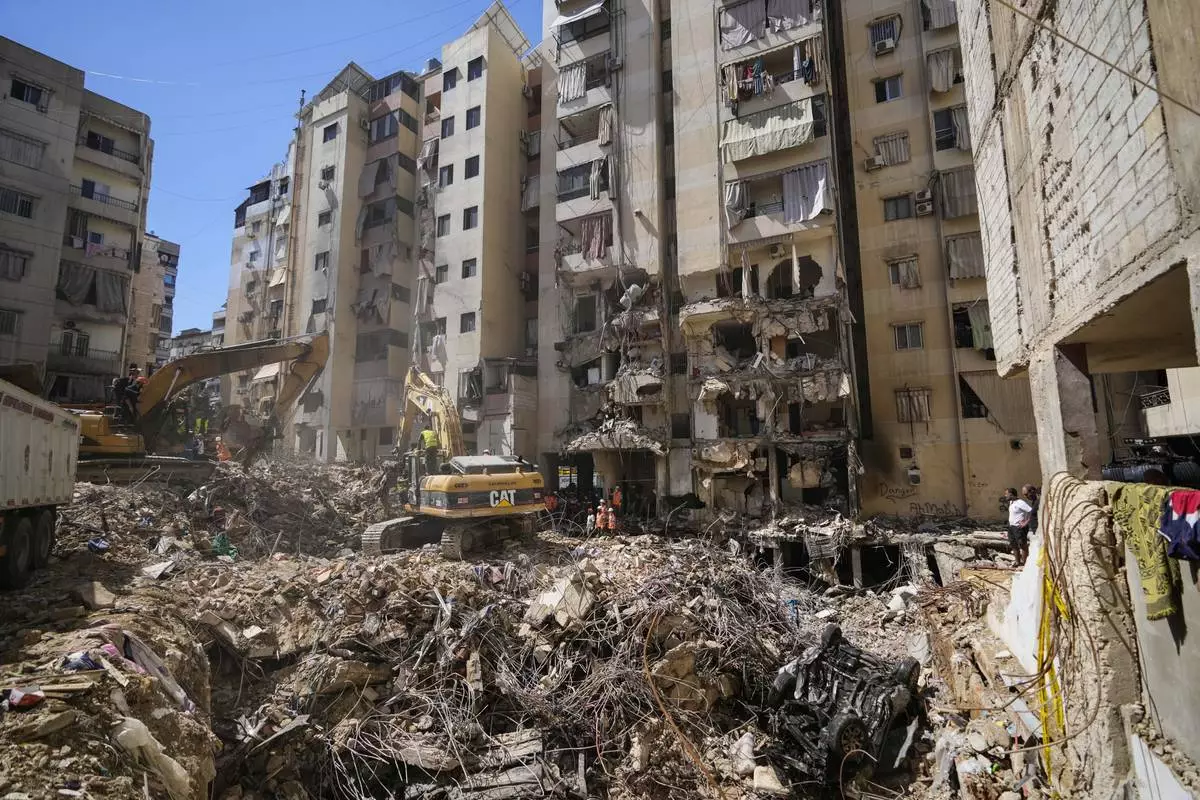
Emergency workers use excavators to clear the rubble at the site of Friday's Israeli strike in Beirut's southern suburbs, Lebanon, Monday, Sept. 23, 2024. (AP Photo/Hassan Ammar)
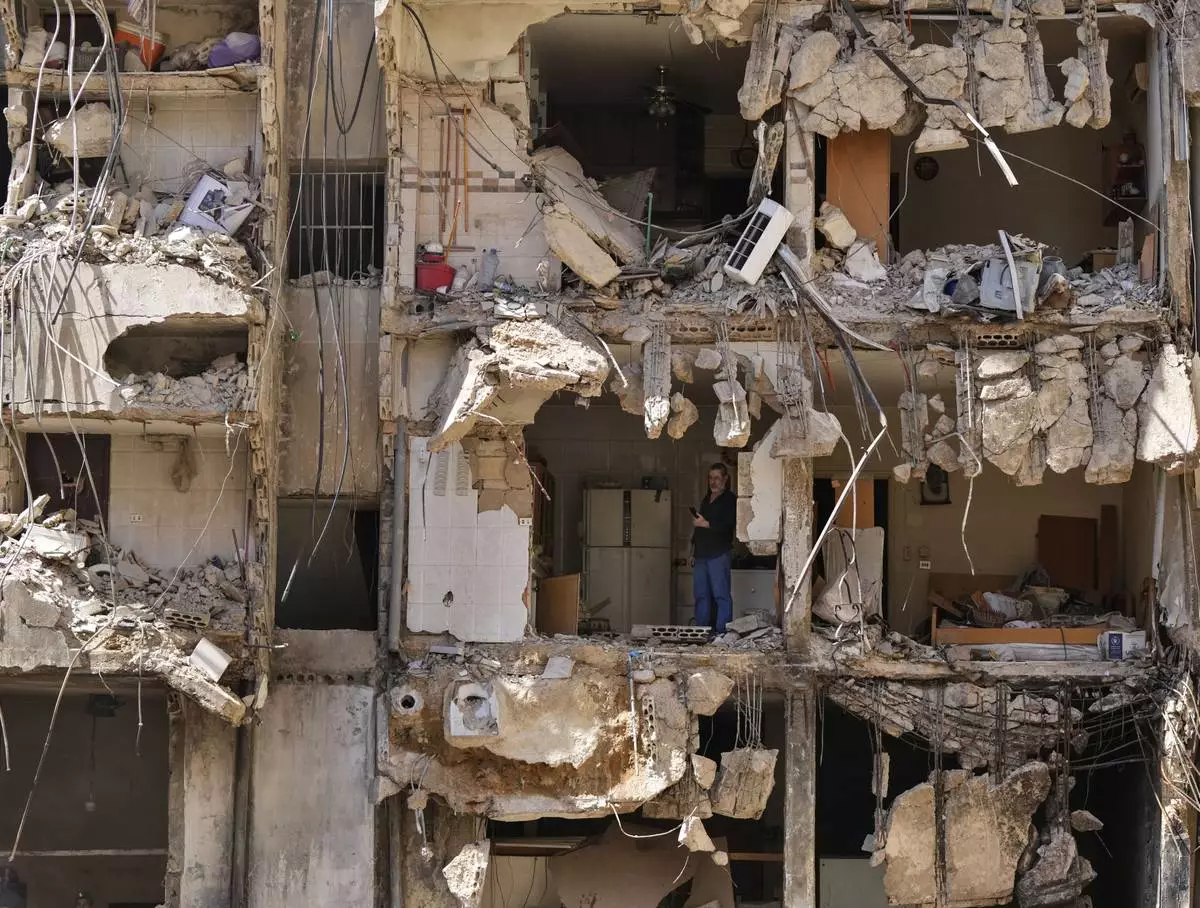
A man watches rescuers sift through the rubble as they search for people still missing at the site of Friday's Israeli strike in Beirut's southern suburbs, Monday, Sept. 23, 2024. (AP Photo/Hassan Ammar)
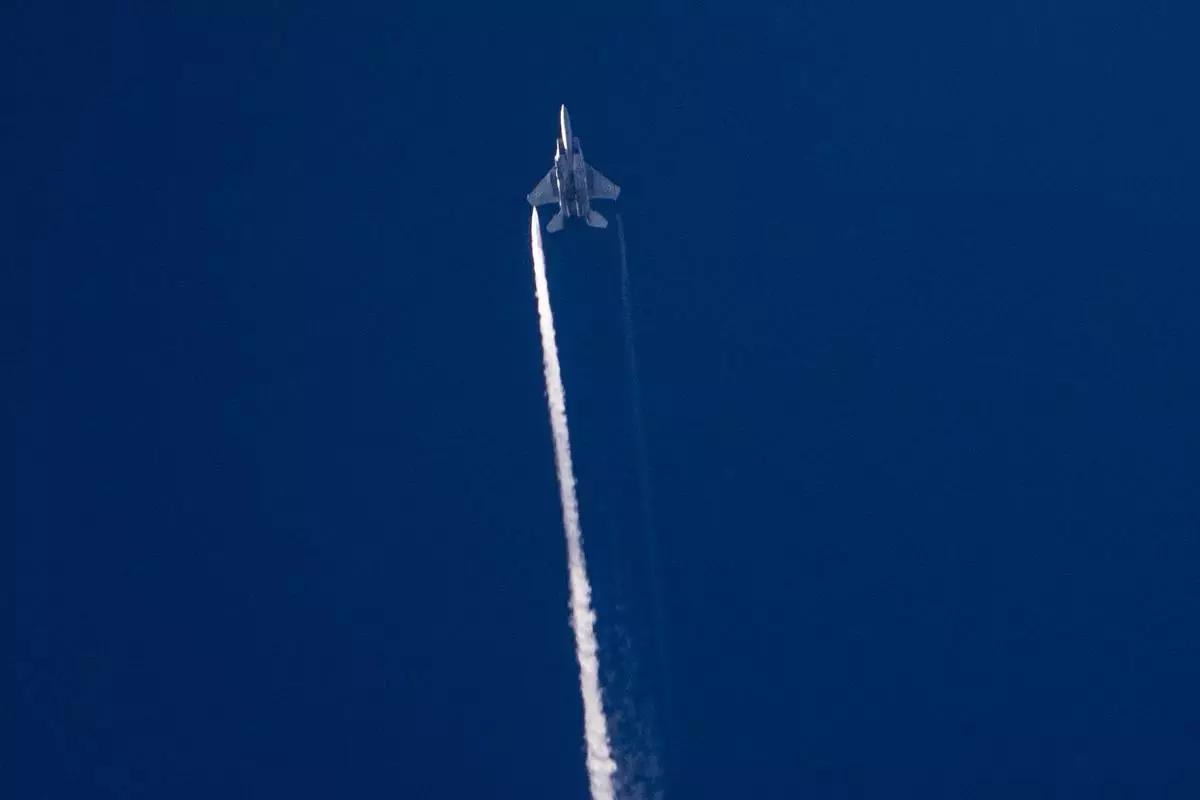
An armed Israeli fighter jet is seen from Hadera as it crosses towards northern Israel, on Monday, Sept. 23, 2024. (AP Photo/Ariel Schalit)
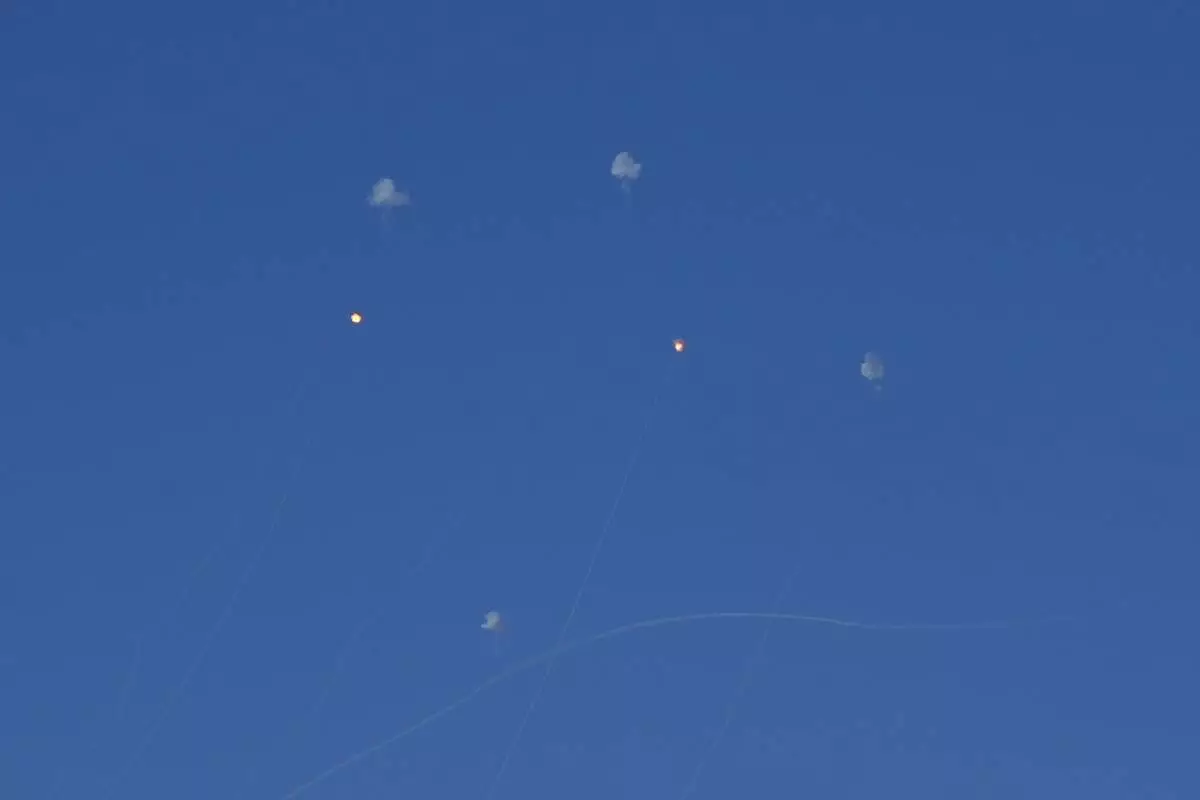
Israeli Iron Dome air defense system fires to intercept rockets that were launched from Lebanon, in northern Israel, Monday, Sept. 23, 2024. (AP Photo/Baz Ratner)
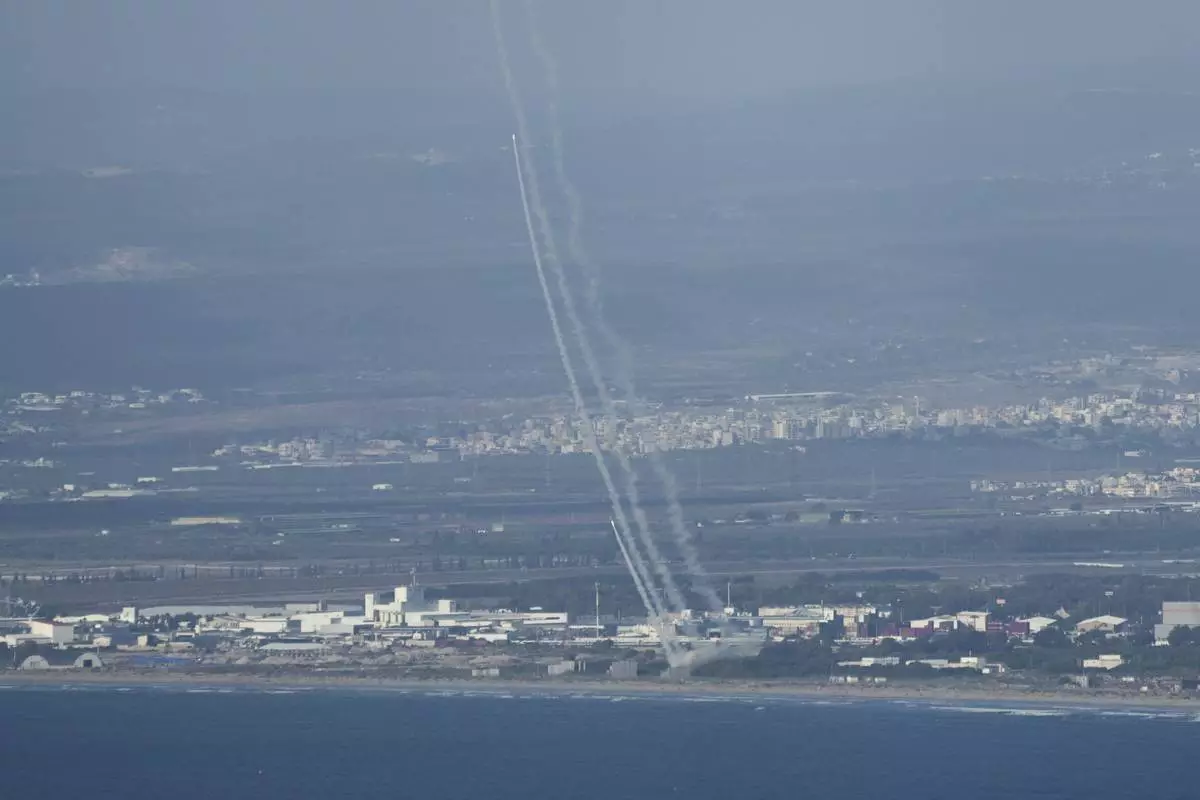
Israeli Iron Dome air defense system fires to intercept rockets that were launched from Lebanon, in northern Israel, Monday, Sept. 23, 2024. (AP Photo/Ohad Zwigenberg)
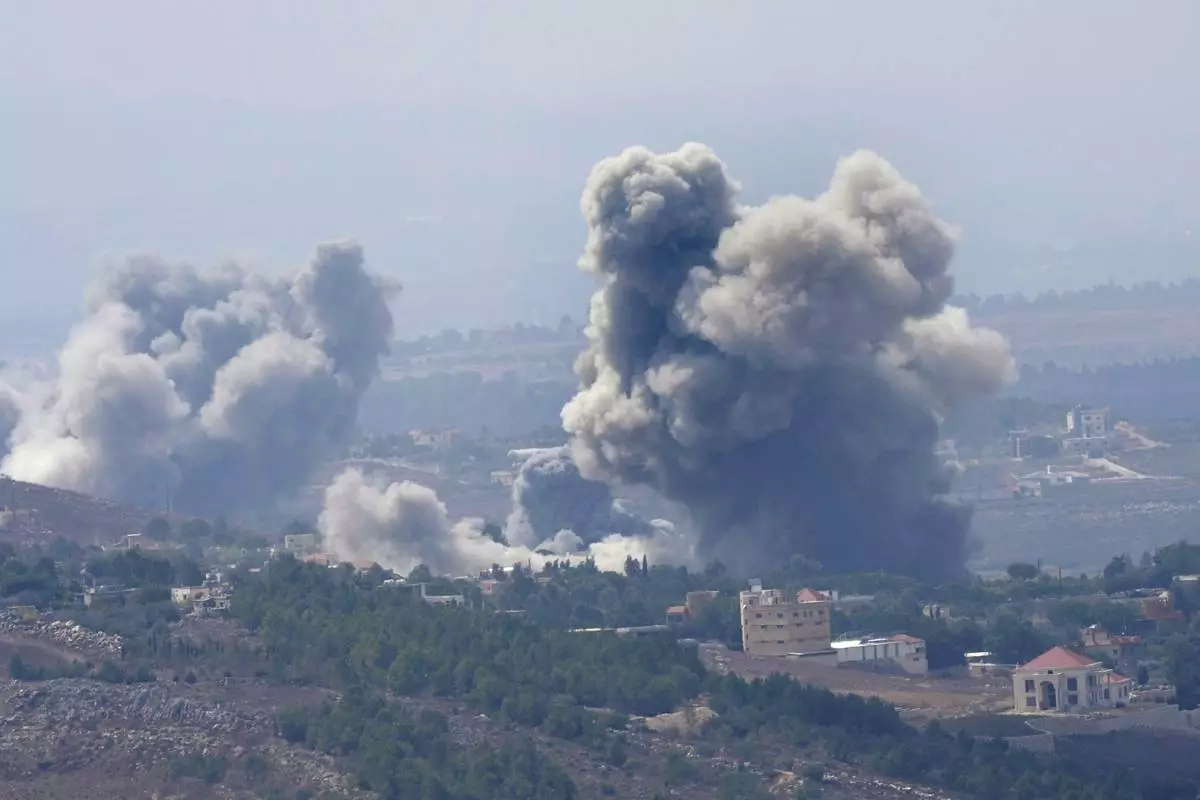
Smoke rises from Israeli airstrikes on villages in the Nabatiyeh district, seen from the southern town of Marjayoun, Lebanon, Monday, Sept. 23, 2024. (AP Photo/Hussein Malla)
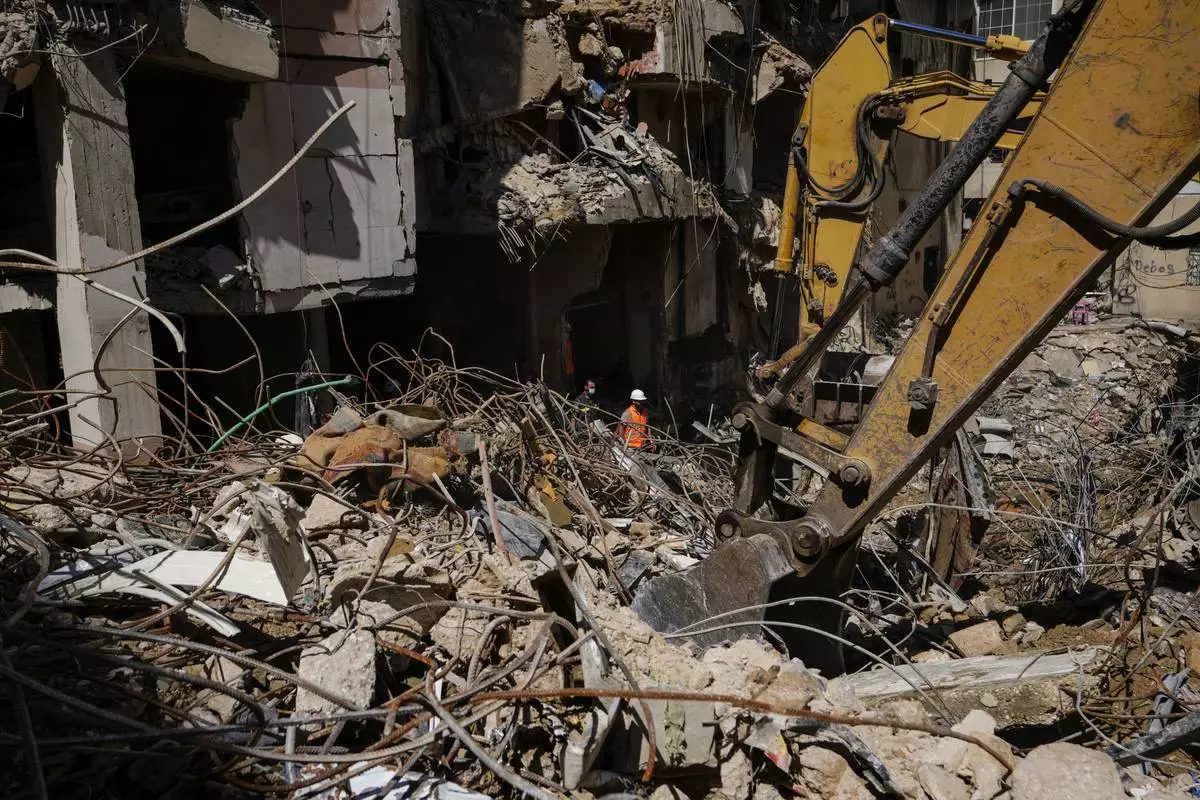
Rescuers sift through the rubble as they search for people still missing at the site of Friday's Israeli strike in Beirut's southern suburbs, Monday, Sept. 23, 2024. (AP Photo/Hassan Ammar)
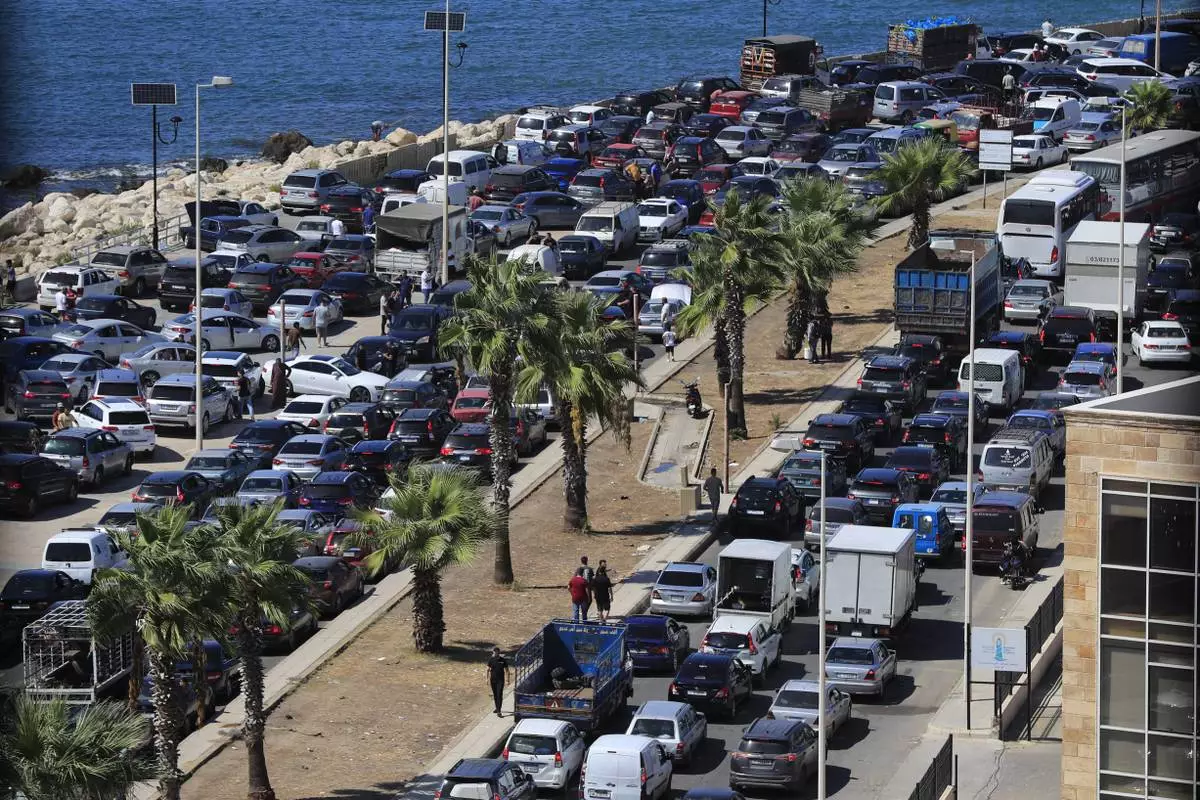
Cars sit in traffic as people flee the southern villages amid ongoing Israeli airstrikes, in Sidon, Lebanon, Monday, Sept. 23, 2024. (AP Photo/Mohammed Zaatari)
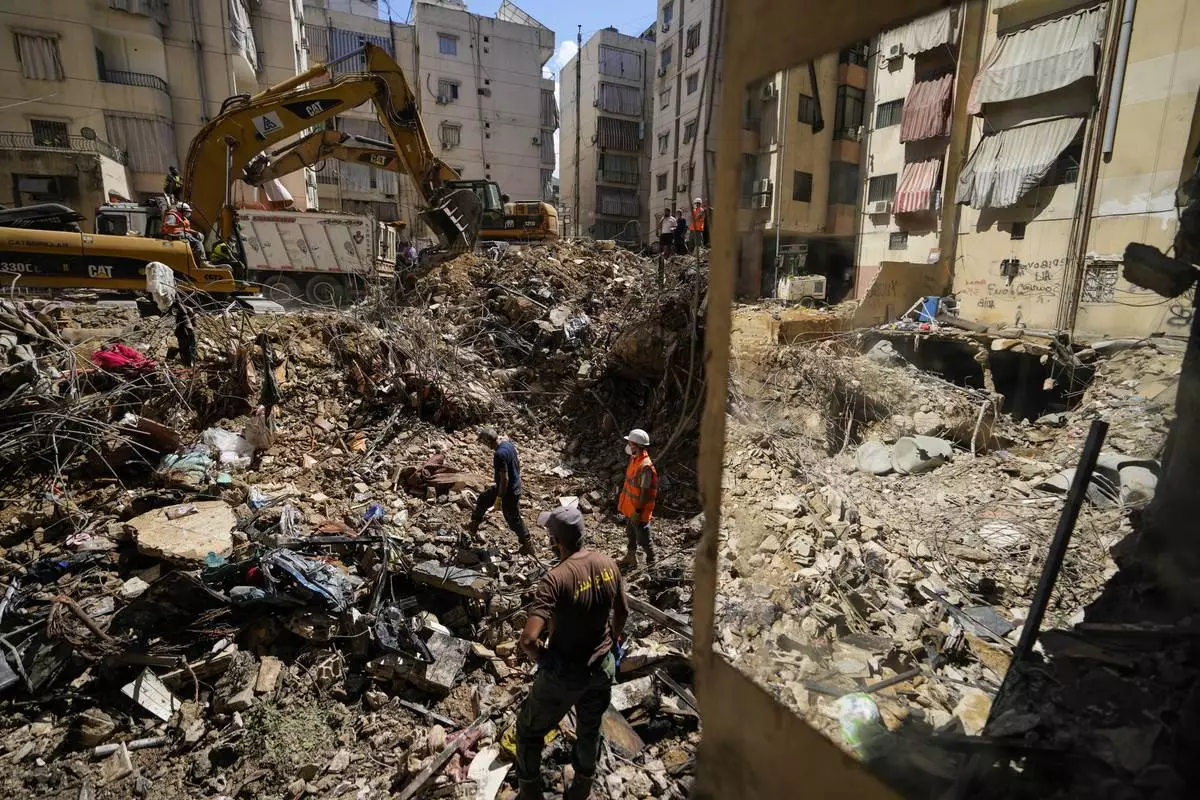
Emergency workers use excavators to clear the rubble at the site of Friday's Israeli strike in Beirut's southern suburbs, Lebanon, Monday, Sept. 23, 2024. (AP Photo/Hassan Ammar)
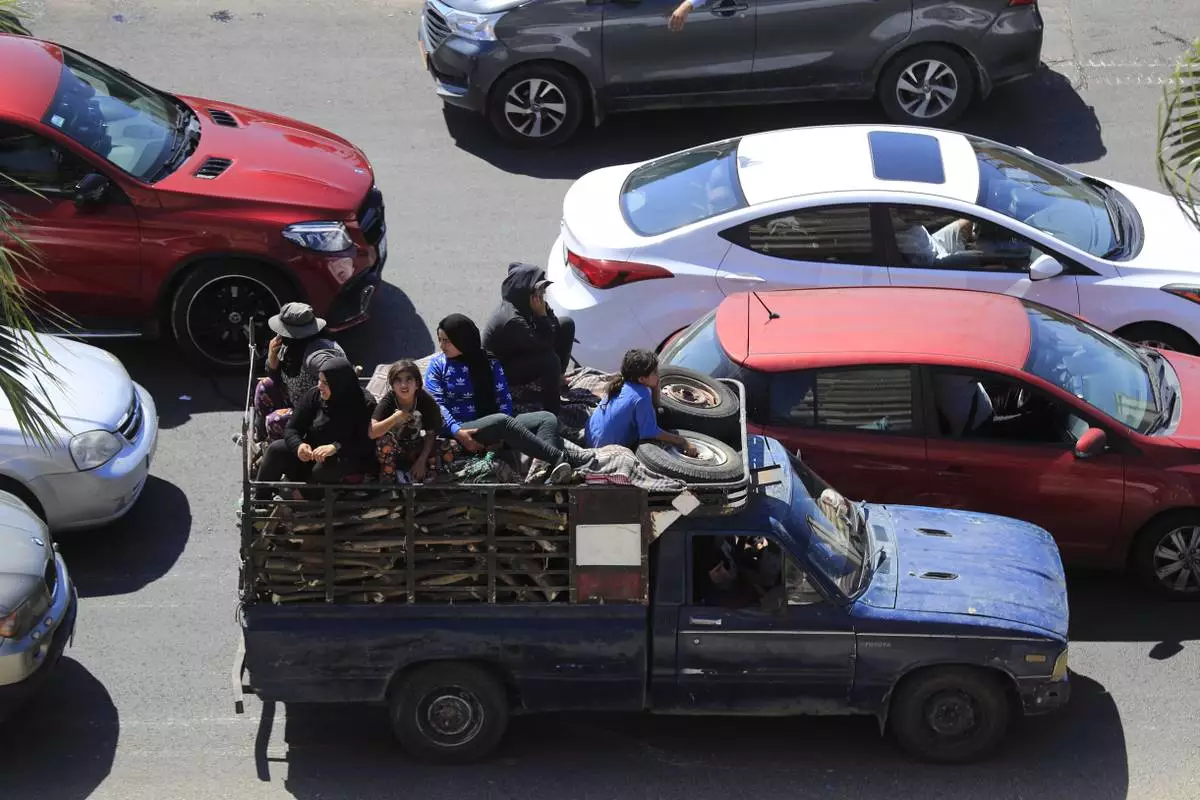
Cars sit in traffic as people flee the southern villages amid ongoing Israeli airstrikes, in Sidon, Lebanon, Monday, Sept. 23, 2024. (AP Photo/Mohammed Zaatari)
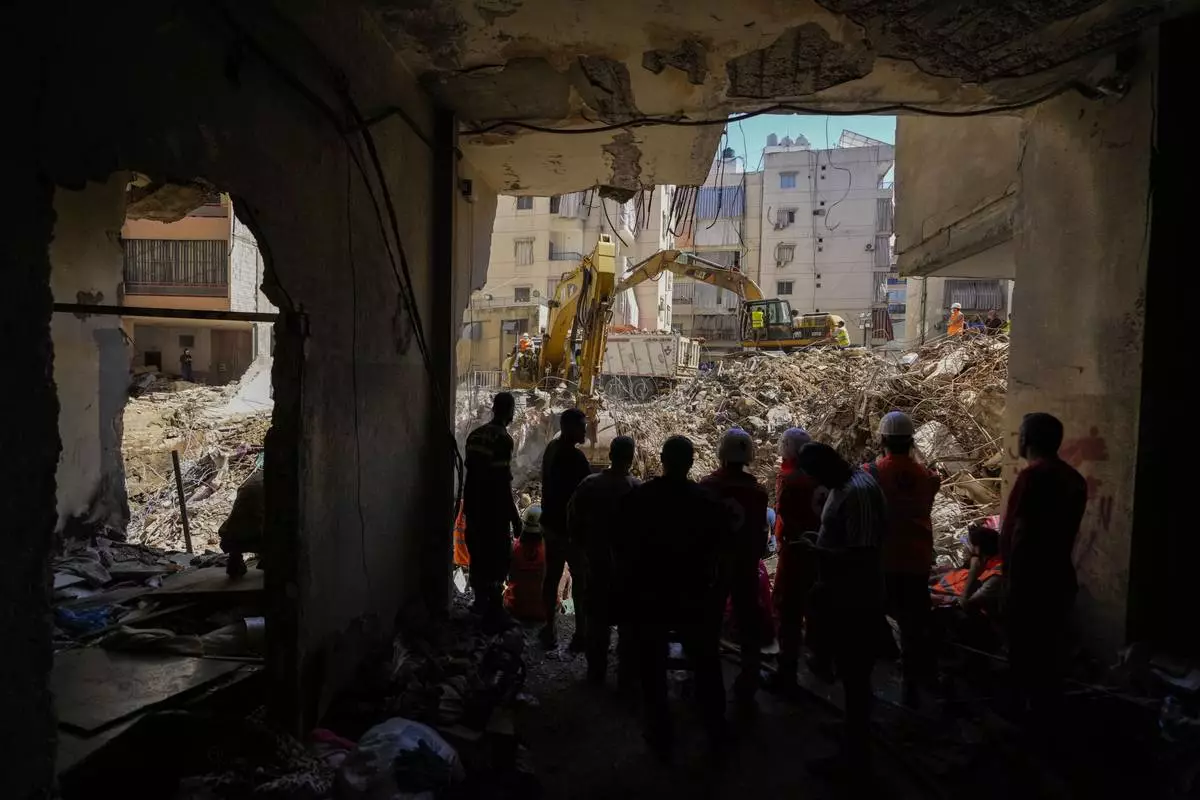
Emergency workers use excavators to clear the rubble at the site of Friday's Israeli strike in Beirut's southern suburbs, Lebanon, Monday, Sept. 23, 2024. (AP Photo/Hassan Ammar)
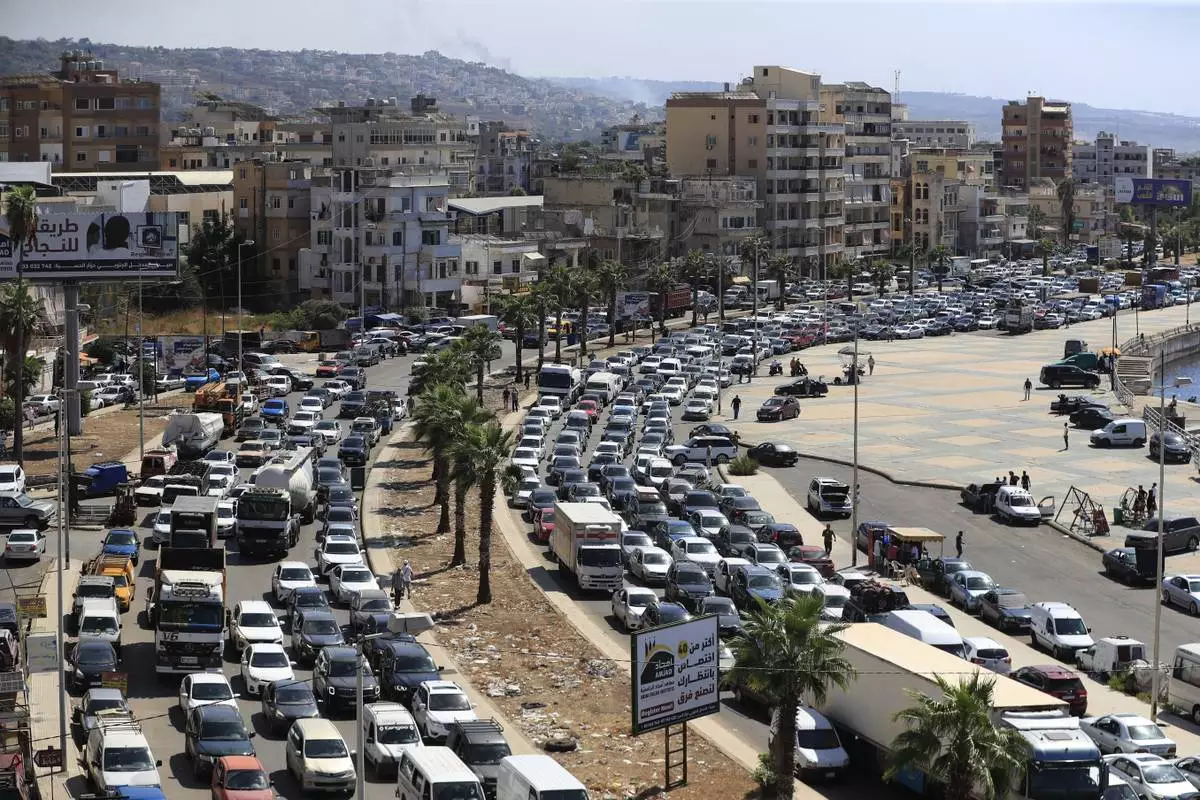
Cars sit in traffic as they flee the southern villages amid ongoing Israeli airstrikes, in Sidon, Lebanon, Monday, Sept. 23, 2024. (AP Photo/Mohammed Zaatari)
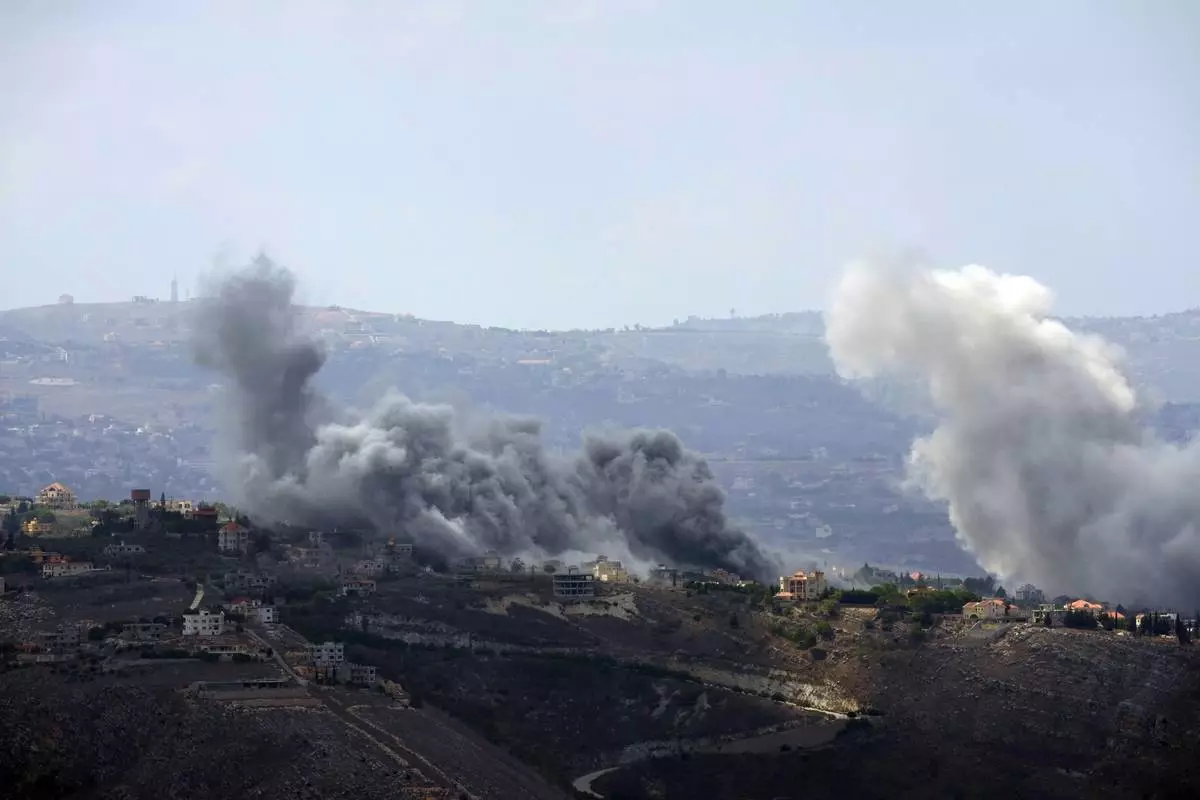
Smoke rises from Israeli airstrikes on Taybeh village, seen from the southern town of Marjayoun, Lebanon, Monday, Sept. 23, 2024. (AP Photo/Hussein Malla)
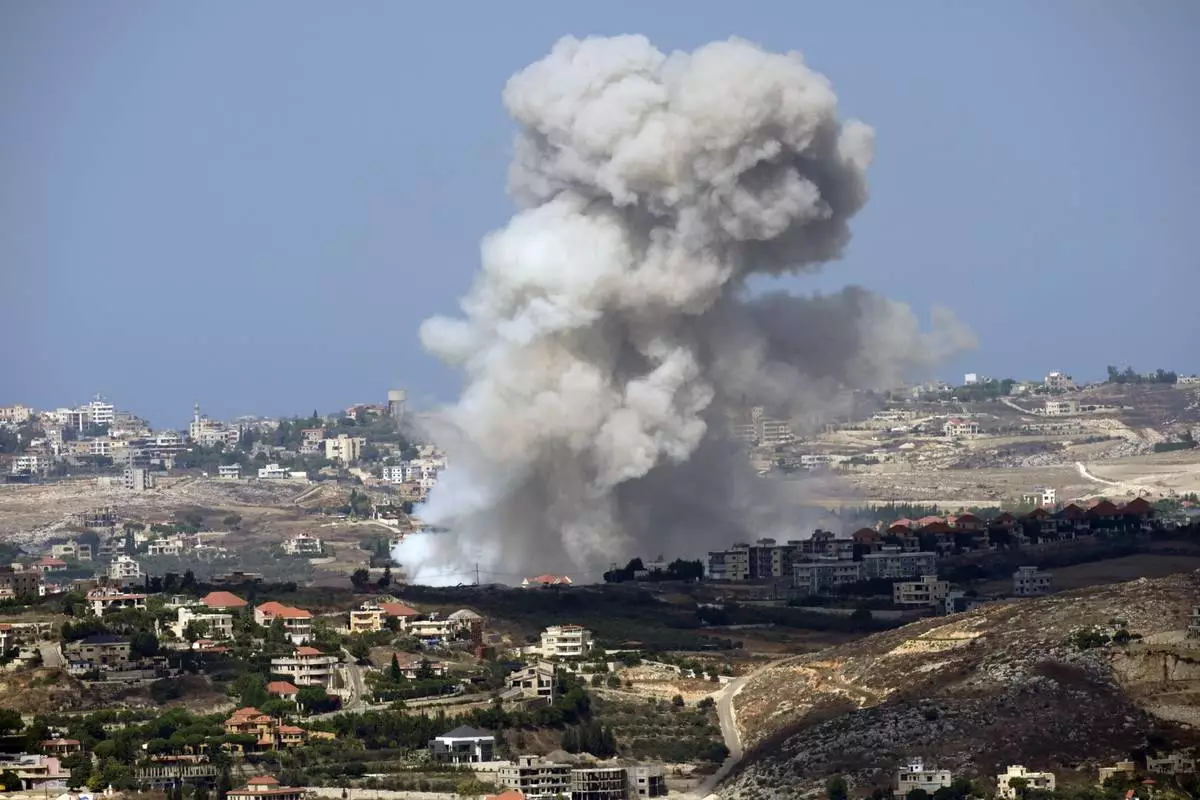
Smoke rises from Israeli shelling on villages in the Nabatiyeh district, seen from the southern town of Marjayoun, Lebanon, Monday, Sept. 23, 2024. (AP Photo/Hussein Malla)
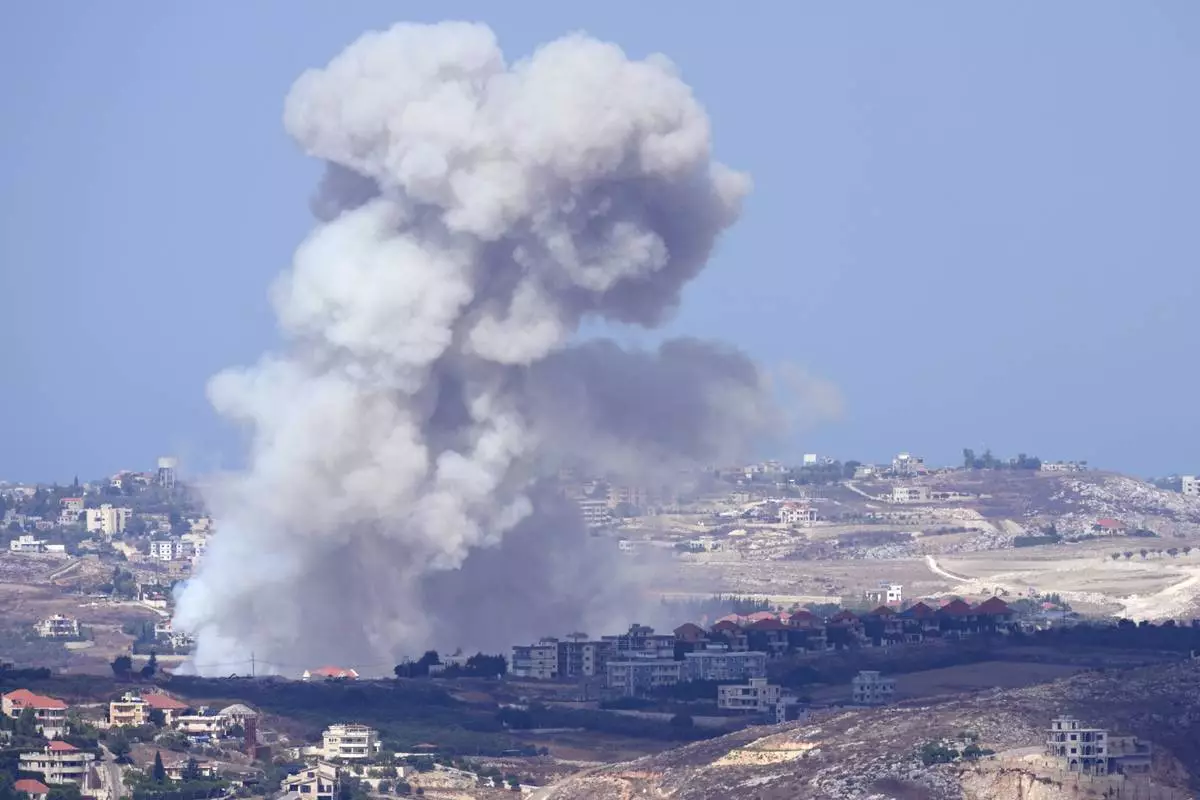
Smoke rises from Israeli airstrikes on villages in the Nabatiyeh district, seen from the southern town of Marjayoun, Lebanon, Monday, Sept. 23, 2024.(AP Photo/Hussein Malla)
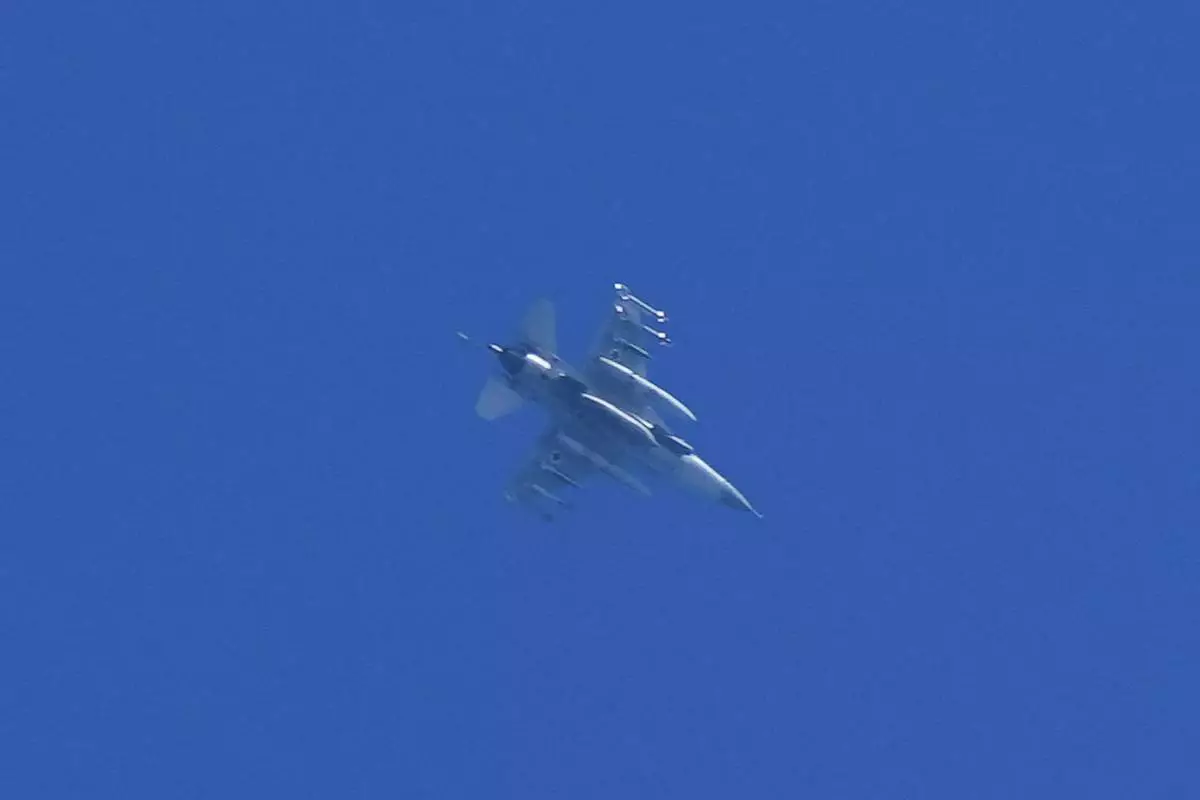
An armed Israeli fighter jet is seen from Haifa, northern Israel, on Monday, Sept. 23, 2024. (AP Photo/Baz Ratner)
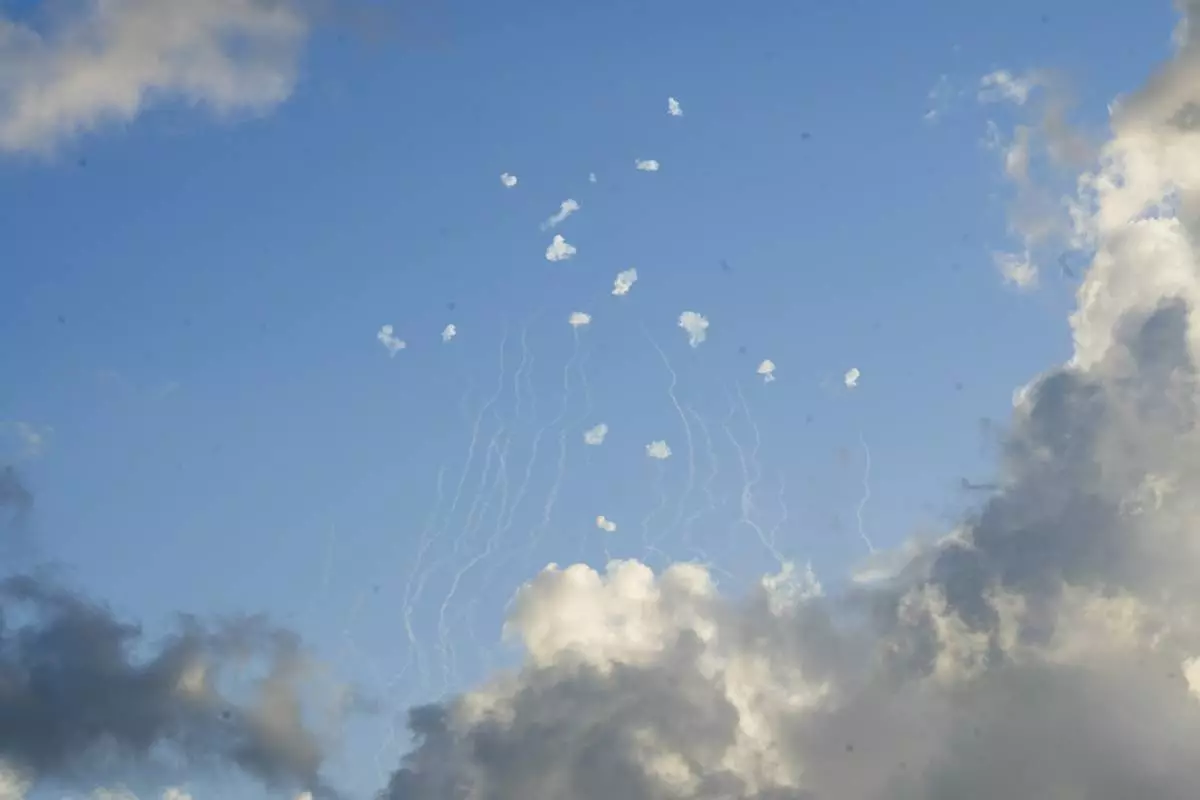
Israeli Iron Dome air defense system fires to intercept rockets that were launched from Lebanon, in northern Israel, Sunday, Sept. 22, 2024. (AP Photo/Baz Ratner)
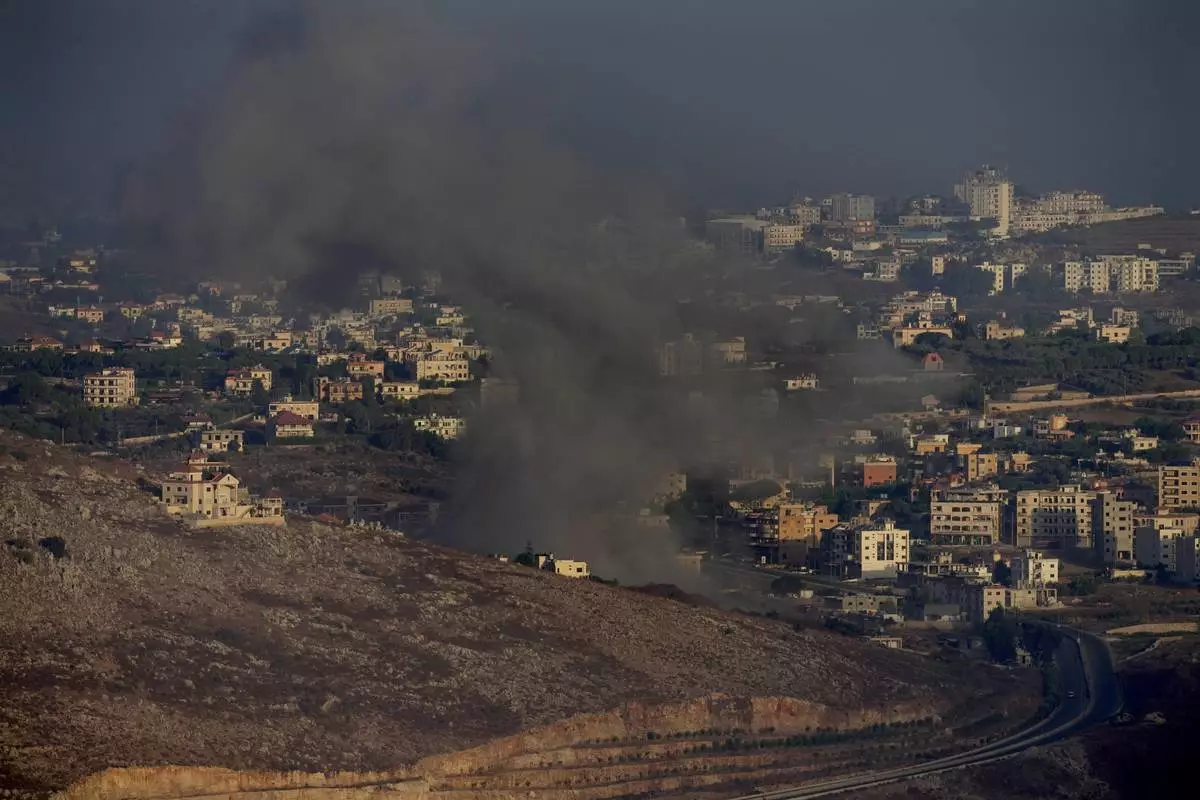
Smoke rises from an Israeli airstrike on Kfar Rouman village, as seen from Marjayoun town, south Lebanon, Monday, Sept. 23, 2024. (AP Photo/Hussein Malla)
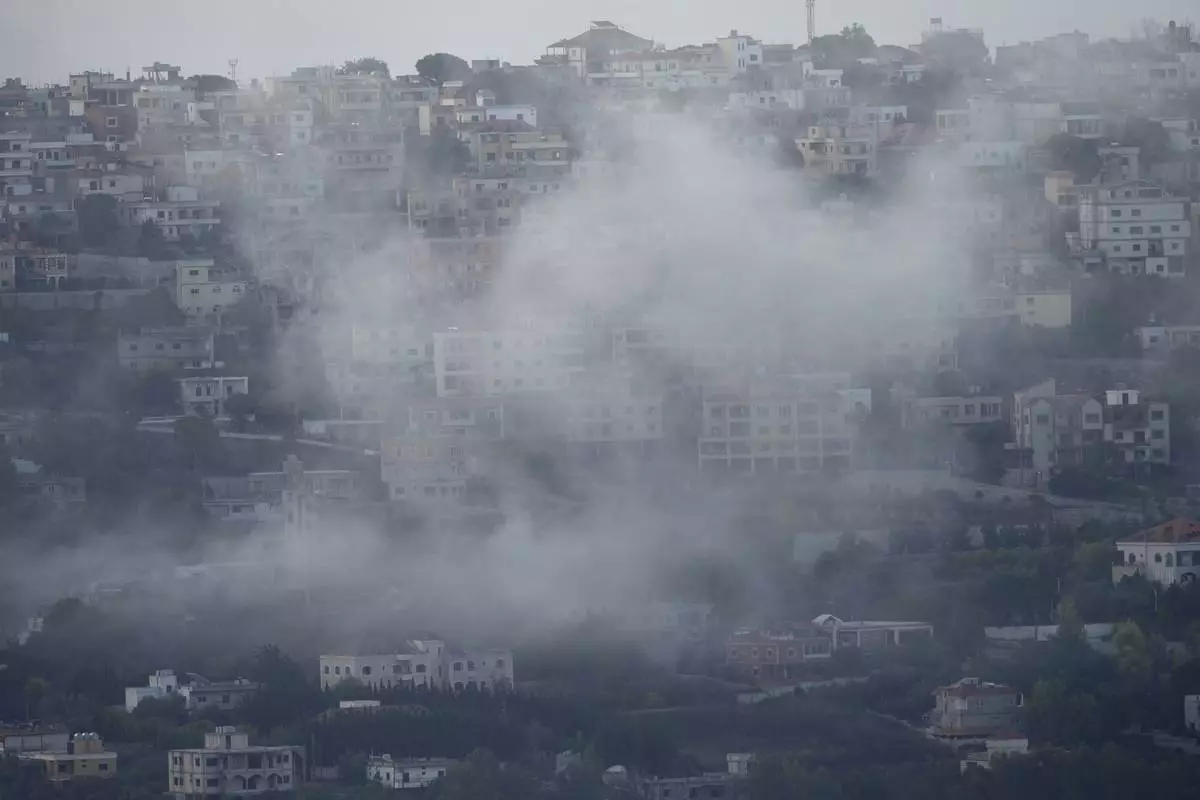
Smoke rises from an Israeli airstrike on Khiam village, as seen from Marjayoun town, south Lebanon, Monday, Sept. 23, 2024. (AP Photo/Hussein Malla)
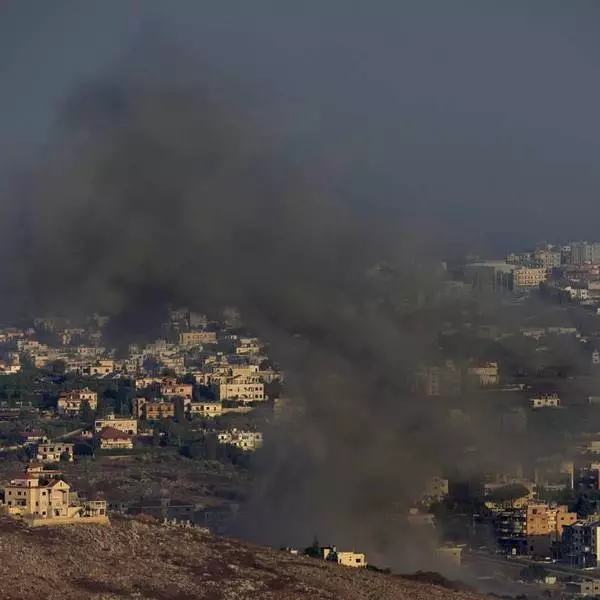
Israel calls on Lebanese to leave homes where Hezbollah stores arms as warplanes launch new strikes
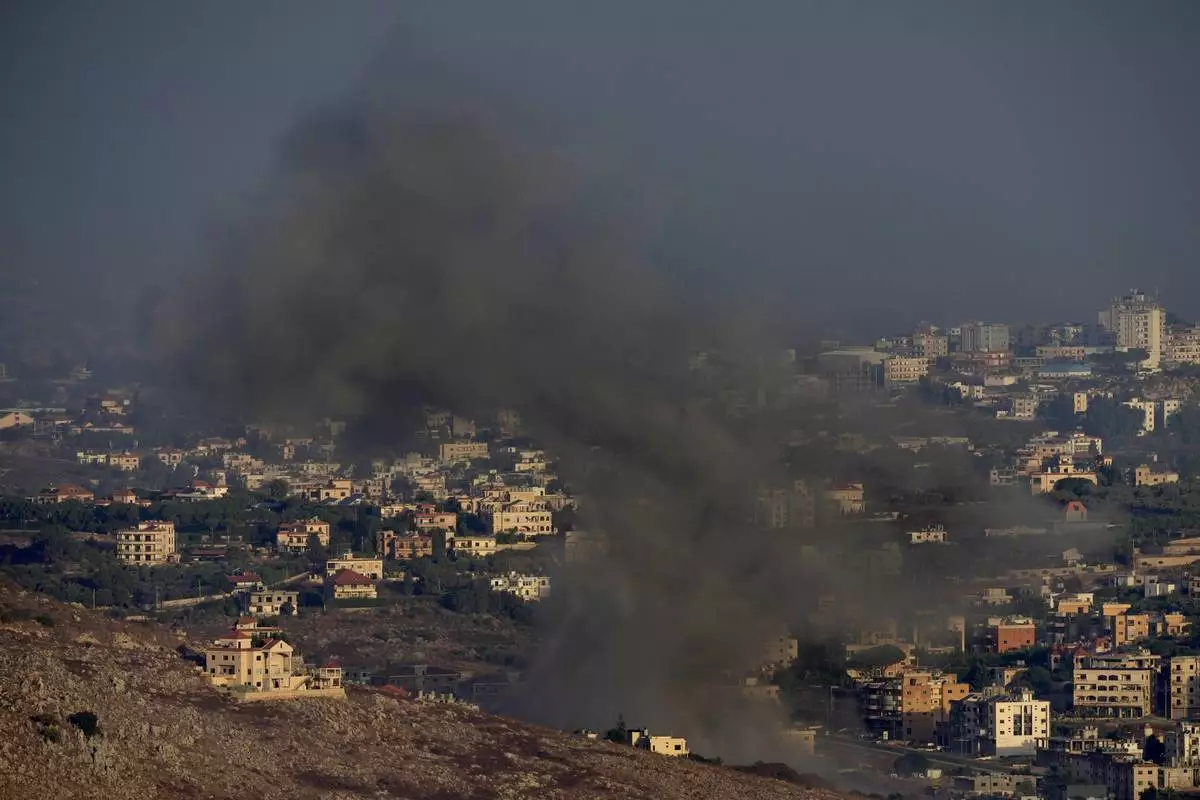
Smoke rises from an Israeli airstrike on Kfar Rouman village, as seen from Marjayoun town, south Lebanon, Monday, Sept. 23, 2024. (AP Photo/Hussein Malla)
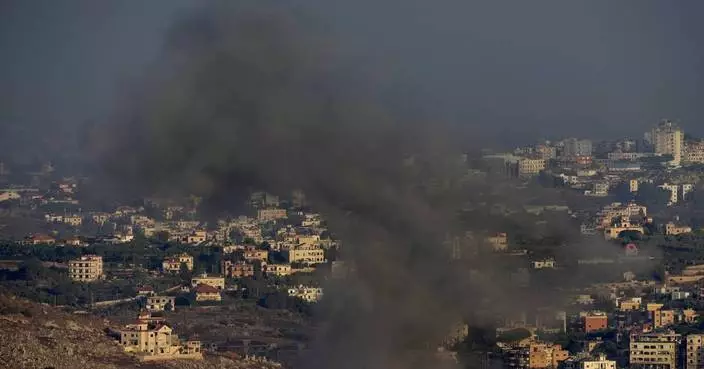
Israel calls on Lebanese to leave homes where Hezbollah stores arms as warplanes launch new strikes



























